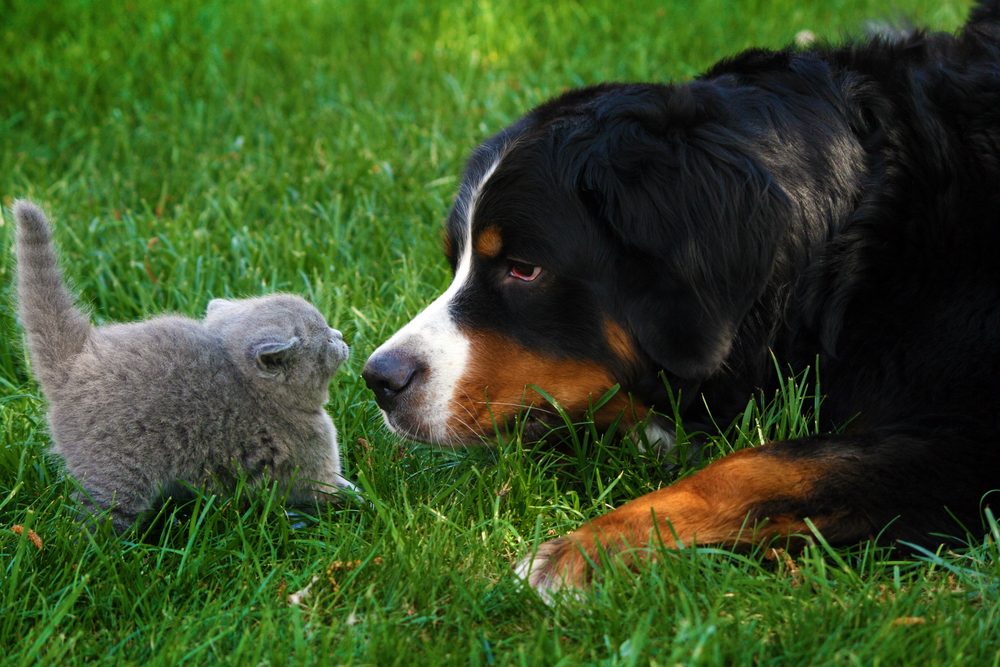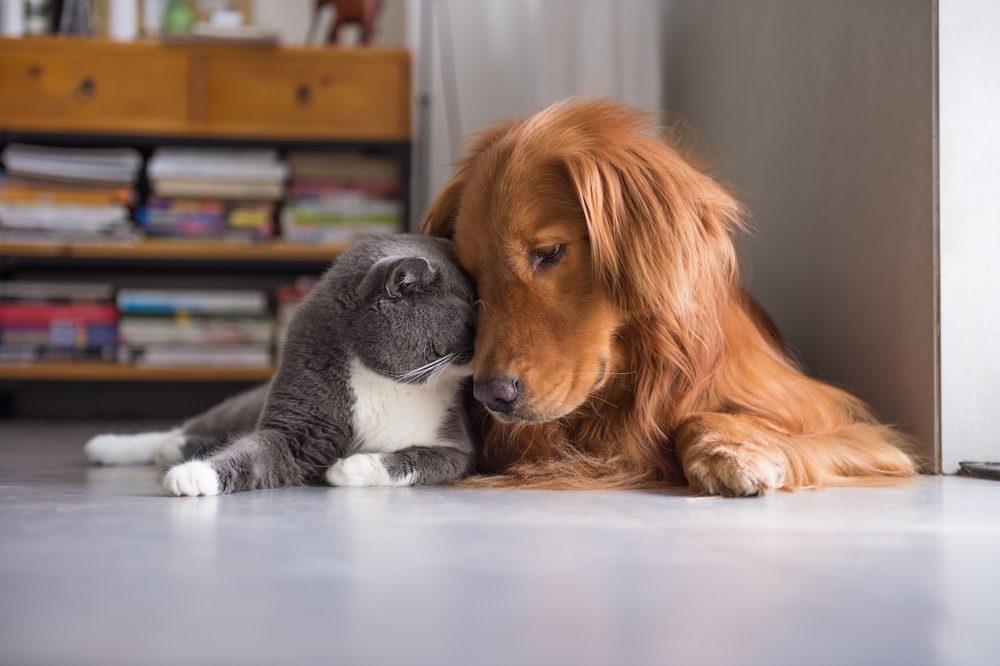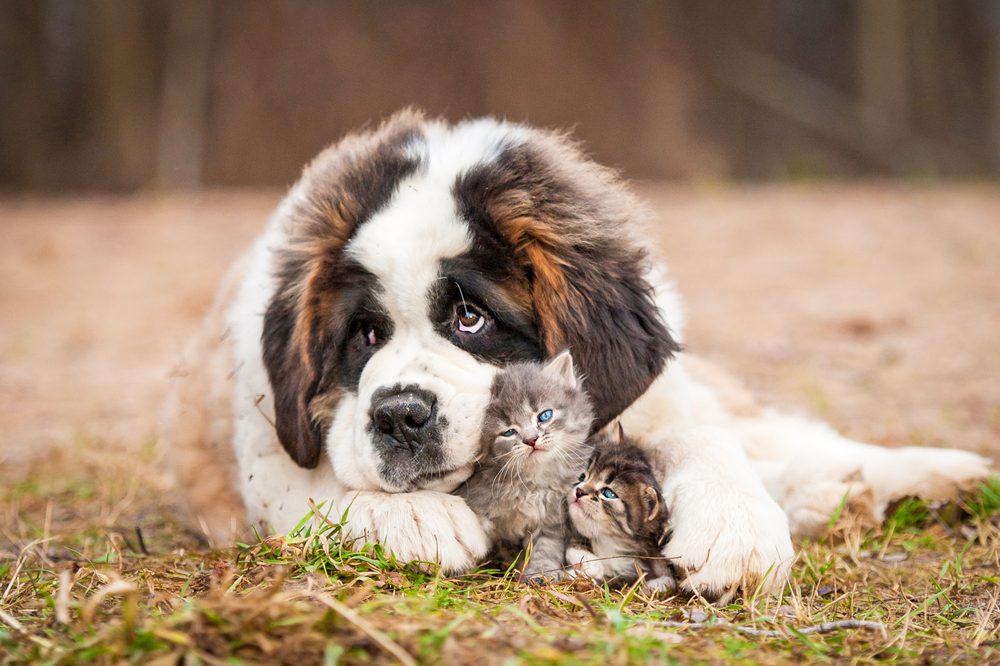Despite what the cliché says, not all cats and dogs necessarily fight like, well, cats and dogs. While it’s a common misconception that all cats and dogs are natural enemies, the reality is more complex. Some breeds, such as Siberian huskies, have a strong prey drive, which causes them to chase small animals like cats. But there are plenty of dog breeds that get along with cats. Surprisingly, some of the largest, most intimidating pups out there can become your furry feline’s new best friend. Let’s take a closer look and get to know six big dogs that get along with cats.

1. Bernese mountain dog
Bernese mountain dogs, affectionately known as Berners, got their start as drovers, drafters, and guardians of livestock in the mountainous regions of Switzerland. Their gentle nature and keen intellect made them beloved companions as well as hard workers. Berners are widely known for their fierce devotion to all members of their family. Weighing anywhere from 70 to 115 pounds and standing 23–28 inches tall, they’re not especially well suited to living in cramped apartments. However, Bernese mountain dogs are calm and patient with children and other animals. Their double coats require regular grooming, and they shed every spring and fall.
2. English setter
A member of the sporting group, the English setter is an ideal companion for families with multiple pets (cats included), children, and seniors. English setters are medium-sized dogs, standing 23–27 inches tall and weighing between 26 and 60 pounds on average. English setters are happy to romp through the yard with your kids, but they’re equally at home lazing about with the family cat. This highly intelligent breed is known for possessing a calm, friendly demeanor, and they don’t bark unless they’re sounding the alarm. Their size and energy level make English setters suitable for apartments dwellers, too. You’ll need to keep their long, silky coats well groomed to prevent tangles.
3. Golden retriever
Golden retrievers are one of the most popular breeds in the world for a reason: They’re relentlessly good natured, intelligent, and family oriented. They stand an average of 20–24 inches tall and weigh from 55 to 75 pounds, making them the perfect size for most households. They form close bonds with all members of the family, including cats, and they’re wonderful with children of all ages. Goldens have a thick, water-repellent double coat that requires regular grooming. They also shed frequently, but their sweet disposition is well worth the flying fur.

4. Labrador retriever
America’s most popular dog breed is a great fit if you’re looking for a cat-friendly pooch. Standing between 21.5 and 24.5 inches tall and weighing 55–80 pounds, Labrador retrievers have a sturdy build that often makes them seem larger than they are. Famous for their kind, even-tempered personalities, Labs are an excellent fit if you have small children, other dogs, or cats. Their short, dense, weather-resistant coats shed frequently, so your Lab will require frequent grooming to eliminate mats. Fortunately, their easygoing manner and innate desire to please make grooming a Labrador retriever a breeze.
5. Newfoundland
This massive breed, a member of the working group, originally served as a pack mule. Newfoundlands, often called Newfies, helped fishermen pull heavy nets out of the water and even aided in removing lumber from forests. Standing as tall as 2 feet, 5 inches and weighing between 100 and 150 pounds, Newfies aren’t the best fit for small spaces. That being said, these gentle giants are perfectly happy to sleep curled up at your feet — or on your lap. Patient and sweet, Newfoundlands bond with all family members, so they’re an excellent choice if you have other dogs, cats, or small mammals like rabbits. The Newfoundland’s coat needs frequent grooming to reduce mats and shedding, but because they’re remarkably easy to train, grooming can become an enjoyable bonding experience.
6. St. Bernard
Originally bred for rescue work, St. Bernards are immense, muscular dogs. They stand as tall as 26–30 inches and weigh from 120 to 180 pounds on average. Despite their tendency to drool and shed, which requires frequent grooming, St. Bernards are one of the best dogs if you have cats. Gentle, watchful, and highly intelligent, St. Bernards are easy to train and more laid-back than most breeds. Despite their intimidating size, St. Bernards are friendly and affectionate. In fact, your pooch may even sulk if he thinks you’re having fun without him.

Introducing a large dog into the family when you have cats may sound counterintuitive, but many large breeds live harmoniously with all members of the family. Because of their size, early behavioral training is imperative. Introduce your dog and cat slowly, supervise their interactions until your pets feel comfortable with each other, and make sure your cat has a safe space your pup can’t access in case she feels overwhelmed. Dogs and cats aren’t natural-born enemies. With training, consistency, and time, your fur babies could become the best of friends.




